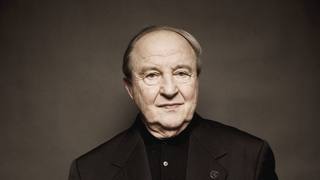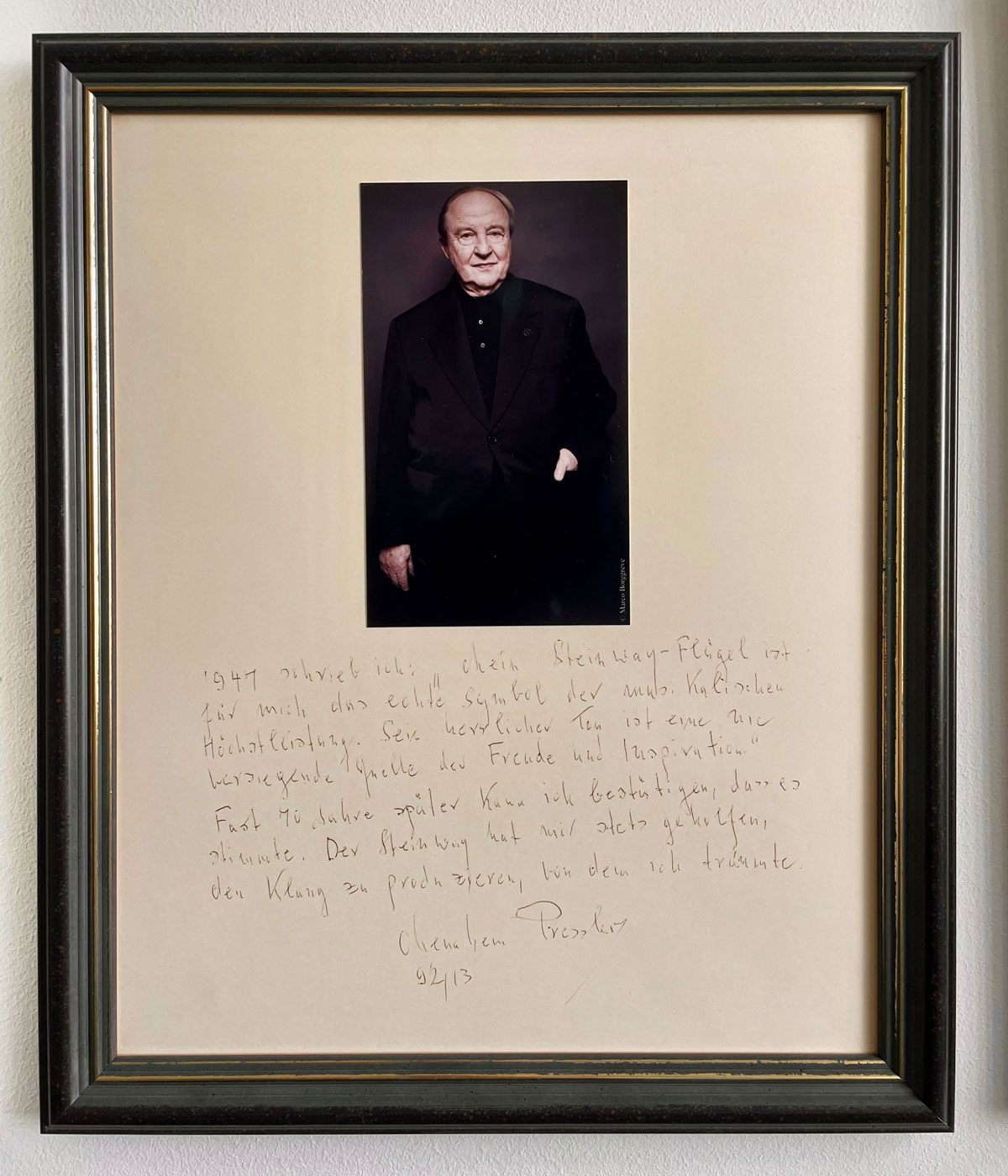
MENAHEM PRESSLER — AN ARTIST OF THE CENTURY
On May 6, 2023, Menahem Pressler died in his centennial year. His life and work as a chamber musician left his mark as an artist of the century.
MENAHEM PRESSLER AND STEINWAY & SONS
Pressler began his over-seventy-year career as a soloist. In 1946, Pressler applied for the Debussy Competition in San Francisco in 1946 at very short notice and traveled from Palestine. When he arrived in New York City (his first American stop), he didn‘t even know some of the required repertoire and was in great need of practice opportunities. It was Henry Z. Steinway who provided them at Steinway Hall. Even then, Steinway‘s attitude was one of a spirit of promoting music and talent with active support, regardless of fame and popularity. This was driven not by profit or apublic relations calculus, but through mutual recognition, empathy and respect. Such remains the case today.
Henry Z. was called down from his office to listen to the young, unknown student. Deeply impressed by his playing, he agreed to let him practice there as long as he wanted. Pressler never forgot this, even after winning the Debussy competition. A lifelong friendship had begun. Long after he became a world-class artist, Pressler mentioned the incident it time and again.

STEINWAY ARTIST WITH THE HIGHEST STANDARDS
Presser was nonetheless a thoroughly critical Steinway Artist. His expectations of the instruments were high, and he was unafraid to call out the condition of a grand piano if it did not satisfy him — or if he desired a Model D onstage, no matter how small the hall. Pressler was able to adapt his sound to any room ambience, effortlessly fitting in as the music demanded.
Menahem Pressler united many opposites: he was small in stature, but a giant in personality. He spoke softly, but his statements were powerful. He was kind and gentle, but in music he was relentless and strict. He maintained the highest standards for himself and his demand for quality from others was absolute. He made no distinction when interacting with students or professional peers.
As chairman of the jury at the ARD Music Competition 2013, Pressler calmly accepted loud expressions of displeasure when he announced that a first prize would not be awarded after a final that was widely regarded as top-class. He made no indulgent gifts. This attitude was both respected and feared.
Pressler knew this feeling from his own experience: the Beaux Arts Trio also had the “Hommage-message à Christian Wolff” dedicated to him on the program for its last concert on August 23, 2009 at the Gewandhaus in Leipzig — a quiet work whose interpretation places the highest demands on its performers and listeners alike. In his introductory remarks, Pressler told the audience that the composer and friend György Kurtág, whom he greatly admired, had "tormented the musicians in two three-and-a-half-hour rehearsals" and that even he was afraid oft he latter’s insistent precision.
MENAHEM PRESSLER'S ELIXIR OF LIFE WAS MUSIC
A day without music was unthinkable for Pressler. So it was only logical that he continued to give concerts after the dissolution of the Beaux Arts Trio and made chamber music with “friends” in numerous new formations. He was extremely disciplined and always arrived at rehearsals well ahead of time in order to practice.
When he sat alone at the piano, it could happen that he suddenly stopped, lowered his head to his chest and remained motionless for a while. Seeing this from a man approaching ninety could be concerning — did a doctor need to be called? No, such breaks for regeneration were a regular part of Pressler's practice. After three minutes, he would straighten up and play as if nothing had happened. He could not abide tardiness. If his fellow musicians weren't there on time, he would ask at the chime of the bell: “Where are they?”
Music was Pressler's elixir of life. He turned to a lot of new repertoire that had been left unattended during the Beaux Arts years: works for solo piano. At the age of eighty-six, he began a new phase in his career. It seemed as if nothing could stop him, neither the ailments that increasingly appeared with age — which brought with it the renunciation of favorite dishes such as duck with red cabbage and dumplings or Dresden stollen — nor a life-threatening aneurysm, with which he unknowingly played the 2014 New Year's Eve concert of the Berlin Philharmonic under Simon Rattle. Sure, he didn't feel well at the time, but cancelling? Unthinkable! The diagnosis came later at home in America, and a spectacular operation saved his life.
Typical for Pressler: during rehabilitation, his physical recovery gradually increased, but his mood decreased. The piano was missing! A call for help was sent to Steinway and the response in New York was prompt: an instrument was delivered and he was able to practice again. Concert plans were once again in place...
MENAHEM PRESSLER'S FAREWELL AS A CONCERT SOLOIST AT THE ELBPHILHARMONIE
Pressler began his career as a soloist and ended it as such. On August 14, 2018, he played his last concert at the Elbphilharmonie in Hamburg. The circle was completed: the final encore was written by the very composer under whose name Pressler's career had once begun in San Francisco: “Clair de Lune” by Claude Debussy. He let the work fade away with great calm. The last note in the treble sounded in an almost inaudible pianissimo, but stood like a pillar in the hall. A moment of musical essence. Like Menahem Pressler himself: unforgettable.
Thank you! Your message has been sent. You will hear from us shortly.